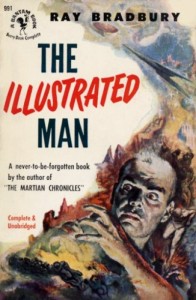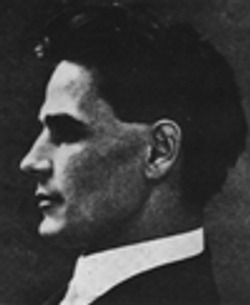 This week some of our favorite authors and editors discuss the fiction that started them on their long and amazing careers. Everyone seems to come to imaginative fiction by a different path. Somehow our first taste always seems to hold a special place in our minds and hearts even after we’ve read hundreds of new stories. With this installment of the ultimate science fiction reading list, I hope you find something new that finds its way into your heart and mind.
This week some of our favorite authors and editors discuss the fiction that started them on their long and amazing careers. Everyone seems to come to imaginative fiction by a different path. Somehow our first taste always seems to hold a special place in our minds and hearts even after we’ve read hundreds of new stories. With this installment of the ultimate science fiction reading list, I hope you find something new that finds its way into your heart and mind.
Award-Winning Author David Brin
“Revolt on Alpha C” was the earliest children’s sci fi book I remember… by Robert Silverberg. Though I vaguely recall some radio and movie theater serials. My exposure to science fiction might have been minimal, limited to the few Bradbury and Asimov books in the local library, if it had not been for those wonderful Best of the Year collections that Judith Merrill put out, that I would happen across in the drug store annually. That, alone, gave me what passes for a fairly good education and background, until high school, when I joined the Science Fiction Book Club.
 Award-Winning Author, Editor, and Critic Gary K. Wolfe
Award-Winning Author, Editor, and Critic Gary K. Wolfe
I’m not sure why I started picking up SF in the local public library when I was 8 or 10, but two titles I remember were Andre Norton’s Star Man’s Son and a novel called Star Ship on Saddle Mountain, by an author with the unlikely but apparently real name Atlantis Hallam, who wrote only a handful of minor SF stories besides the novel. When I started buying paperbacks with my allowance, the first one I remember paying for was Bradbury’s The Illustrated Man, so I really started out as a rather heavy Bradbury fan. His was the first name I knew to look for, and Ballantine was the first publisher I came to feel I could depend on. Sturgeon and Clarke followed, and I came a little late to Heinlein and Asimov.
Award-Winning Editor Neil Clarke
It all started with Lost in Space and spiraled out from there. I have many fond childhood memories of that show and have made sure my children were exposed to it at an early age.
SFWA Grand Master Ursula K. Le Guin
My older brother and I read Astounding, Amazing, Fantastic, and other SF magazines now and then, but the first sf that really hit me was The Pocket Book of Science Fiction—1943—edited by Don Wollheim. I was 13. My favorite story in it was Stanley Weinbaum’s “A Martian Odyssey.” I still love that story.
 SFWA Grand Master Michael Moorcock
SFWA Grand Master Michael Moorcock
The Master Mind of Mars by Edgar Rice Burroughs. When my father fled the family home Christmas Day 1945 he left five books behind. One was that ERB book, another was Son of Tarzan and another was The Apple Cart by George Bernard Shaw. The others were boys’ books he’d won as school prizes. One was The Constable of St Nicholas by Edward Lester Arnold. For years I thought to be a proper writer you had to have three names. My early work was always signed ‘Michael J. Moorcock’… The first book I bought with my own money was The Pilgrim’s Progress by John Bunyan. Reading that made me think a book had to provide at least two meanings and not just be ‘a story’. The first ‘modern’ SF book I read was The Stars My Destination by Alfred Bester. That was when I realised what SF could do. I bought it in Paris when I was 16.
SFWA Grand Master Brian W. Aldiss
Judged as art, the stories in several U.S. magazines did not amount to much, while the Brits were even worse when Vargo Statten SF Magazine appeared in 1954. Many of the stories there were written by John Fearn, also known as Volstead Gridban. ‘New Worlds,’ edited by John Carnell, showed improvements, and published stories by Mike Moorcock and me.
But I, at least, was aware that something closely resembling SF had been published and proved popular for centuries.
Better not go into what those Continentals were doing, but—to give a British instance—Bishop Francis Godwin published ‘Man in the Moone” in 1638. It remained popular for two centuries.
Award-Winning Author C. J. Cherryh
The original Flash Gordon serial. When that went off the air, after about 5 complete runs, I had to write my own episodes—but I was so afraid of the plagiarism police (thank my 5th grade teacher) that I changed every fact and character to something opposite. And ended up with an original.
 Award-Winning Author Michael Swanwick
Award-Winning Author Michael Swanwick
As a child, I read science fiction along with everything else—The Space Ship Under the Apple Tree, The Wonderful Flight to the Mushroom Planet, all the Tom Swift Jr. books, and so on—but indiscriminately, along with everything else. Then, at age sixteen, I discovered J. R. R. Tolkien’s Lord of the Rings trilogy and my fate was sealed. I wanted to be a writer and specifically a fantasy writer. By the time I got to college, I’d read pretty much every work of fantasy ever written, and started reading science fiction because it gave me a fantasy-like “kick.” (There were a lot of fantasy writers who were essentially hiding out in science fiction at the time, writing what would have been fantasy if the hero hadn’t arrived in the land of marvels via a spaceport, which was referred to at the beginning of the novel, never shown, and quickly forgotten.) By degrees, my primary loyalty shifted away from fantasy because science fiction required all the skills needed to write fantasy but also a knowledge of science and the ability to make it integral to the story. Young writers are ambitious and science fiction seemed more difficult to write, and so I was naturally drawn to it.
Nowadays I find myself more and more drawn to fantasy, because it has so much untapped potential. Science fiction is a mature genre, but fantasy seems to be just hitting its stride. So I may be coming full circle with my younger self. Then again, it all depends on what ideas come to me. I could as happily spend the rest of my life writing science fiction.
Let us know what first ignited your passion for imaginative fiction in the comments section below.










